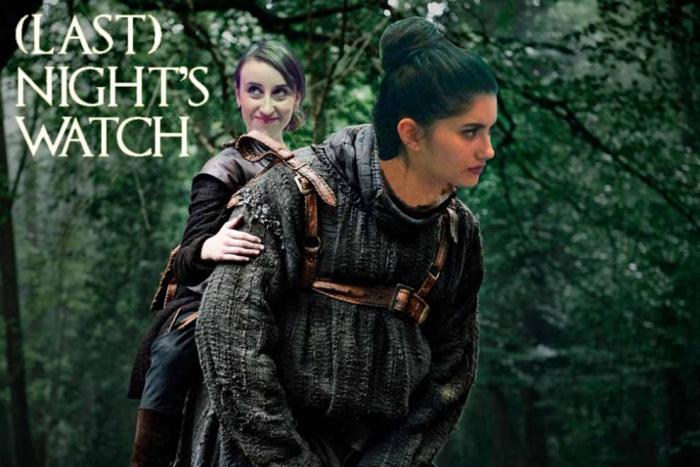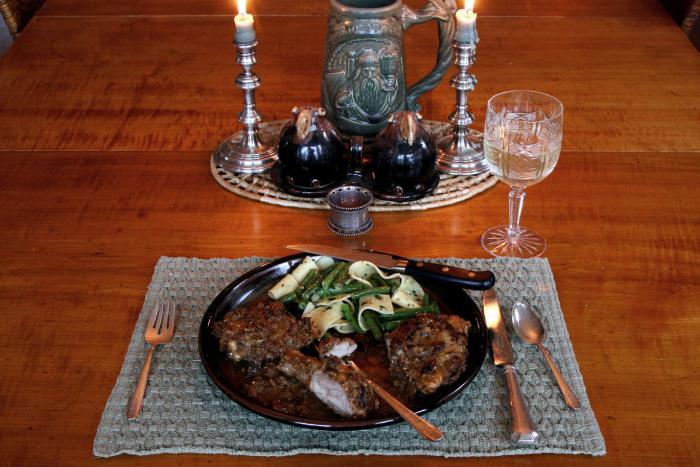"all your hands are verbs,
now you touch worlds and feel their names –
thru the thing to the name
not the other way thru" —Gwendolyn MacEwen, “Poems in Braille”
“It’s funny. I have this reputation of being a controversial artist, or a provocateur. For me, I would love to take pictures of cats and dogs—nice portraits of cats and dogs and children. But people expect something else of me.” —Andres Serrano, The New York Times Magazine
This past Mother’s Day, an acquaintance posted a selfie on Facebook. Shot from the neck down, the photo displayed a close-cropped rectangle of her chest, proudly clad in a brand-new T-shirt, the words PAPA BEAR stretched across it. “Thanks, family, for the first Mother’s Day wishes,” read the caption. (Her wife had given birth to their first baby in late January.) The post elicited a cascade of positivity—how could it not? It was adorable!—but tucked between the messages of delight and affection was a glib response from a well-meaning goof.
“Are you sure you wanna wear the dad shirt?” he asked. “It means crappy ties and Brut by Faberge for the next 15 years.” Dumb joke, sure, but this acquaintance refused to let it slide. “He already has his dads,” she wrote. (In addition to my friend and her wife, this lucky baby also counts a gay male couple as part of its parental sphere.) “I am Papa. Plus we are gay—we don't do crappy ties and Brut. But respect to those who do.”
Labels can be awkward, heavy things. This isn’t any more true when you have a kid than it is in the great big kid-free universe. But as an identity category, parenthood is weird and mutable. It’s entirely contingent on something that exists outside yourself, a being that is connected to you through biology or choice. For those who occupy, by virtue of gender, sexuality, relationship paradigm, or some other variable, a liminal space—neither “Mother” nor “Father,” but something along that spectrum—it can be maddening to find a title that both comfortably fits and signifies that role to the broader world. And if you, like so many people, have a fraught relationship with your family of origin, you may fumble around in search of a term free from the baggage of your smothering emotional vampire of a dad or your abusive, now-estranged mom.
At best, language is a sort of prosaic animation of Heisenberg’s Uncertainty Principle: The closer you get to pinpointing a fixed, laser-sighted word, the further you get from encapsulating all the meanings available to you—they’re relegated just out of reach of what you’re saying, or what you’ve said, a sad rush-ticket line of second-tier thesaurus definitions. And the closer you get to sorting out the glimmering webbed morass of what you actually mean, the more ineffable it becomes. “Language,” runs one version of a variously (mis)translated Flaubert quote, “is a cracked kettle on which we beat out tunes for bears to dance to, while all the time we long to move the stars to pity.”
This ham-fisted scrambling, the dialectic between real, lived experience and the cracked-kettle words we use to describe it, is the driving force of Maggie Nelson’s The Argonauts. Within the first two paragraphs, Nelson, a poet, professor, and theorist who works in hybrid forms, deftly sets up this conundrum. “Before we met,” she writes, “I had spent a lifetime devoted to Wittgenstein’s idea that the inexpressible is contained—inexpressibly!—in the expressed.” Meanings, even unspoken ones, are always-already spilling over, gushing out of every syllable of every utterance. Words contain multitudes! Falling in love, that most archetypal of collisions, wreaks havoc on Nelson’s linguistic conviction. Her partner, the artist Harry Dodge, is equally committed to the notion that words are “not only not good enough, but corrosive to all that is good, all that is real, all that is flow.” To Dodge, a multidisciplinary creator whose work occasionally involves a kind of visual semiotic punning, language is violence. “Once we name something, you said, we can never see it the same way again. All that is unnameable falls away, gets lost, is murdered.”
*
When you exist in a realm of both/and, of neither/nor, it stands to reason that you’d have an inherent distrust of words. More than a half-century after the first stirrings of post-structuralism, society is still rooted in digital templates and violent hierarchies. Language itself is founded on binary logic. This is something parenthood brings into sharp focus: every fifth children’s book is, literally, a brightly coloured study in opposites. It’s amazing that kids are able to grasp any nuance at all, given how much of their early life is taken up with an endless recitation of short/tall, big/small, high/low, stop/go. If, like Dodge, a masculine-of-centre person whose testosterone injections and medical transition Nelson documents in The Argonauts, your experience of self places you outside a neat dichotomy, it seems utterly implausible that a system founded on binary logic could adequately express your reality. “How to explain, in a culture frantic for resolution, that sometimes the shit stays messy?” Nelson asks. “How to explain that for some, or for some at some times, this irresolution is OK—desirable, even—…whereas for others, or for others at some times, it stays a source of conflict or grief?” For some, or for some at some times, language will forever be a borrowed, ill-fitting shirt infused with the smell of an alien body.
Nelson is too deft and too rooted in her own artistic marrow to turn this exercise into a hollow, two-sided (binary) philosophical argument. But at the crux of The Argonauts is a love story—about her relationship with Dodge, who flickers through the text as a muse and a foil, about their experience of becoming and being parents, and about the domestic envelope that their small family both inhabits and exceeds. This process inevitably causes tectonic shifts inside Nelson herself. Traces of Dodge’s worldview ricochet off the sides of her own pronouncements. “While we talked we said words like nonviolence, assimilation, threat to survival, preserving the radical,” Nelson writes, recalling a night spent playfully bickering about X-Men: First Class in a Sheraton in Fort Lauderdale, where Dodge is recovering from top surgery. “But when I think about it now I hear only the background buzz of our trying to explain something to each other, to ourselves, about our lived experiences so far on this peeled, endangered planet.”
Meanings, even unspoken ones, are always-already spilling over, gushing out of every syllable of every utterance. Words contain multitudes!
Those echoes sit alongside a constant march of statements from theorists, thinkers, psychoanalysts, friends, artists: Deleuze, Winnicott, Eileen Myles, Judith Butler, Eve Kosofsky Sedgwick. Their comments, off-kilter in jaunty italics—a sign of either emphatic agreement or ironic distance—are fully integrated into Nelson’s first-person poetic fragments. Her voice is never just her voice; it’s a cacophony of the knowledge she’s consumed, synthesized, and extruded.
The Argonauts is not memoir. There’s no single silvery thread of narrative to grasp. The form itself is quietly, gloriously anarchic. In one interview, nodding to the contemporary philosopher Paul B. Preciado, Nelson describes her project as “autotheory”—an attempt to conceptualize the self. It’s a non-linear collection of impressions, notions and moments, loosely organized around a) her own pregnancy, b) her efforts, with Dodge, to create a home, c) the death of Dodge’s mom, d) Dodge’s gender transition, e) their baby, Iggy, f) who suffers, at one point, from a serious medical issue, “a potentially fatal nerve toxin that affects about 150 babies of the 4 million+ born in the United States each year,” the anxiety and terror of which Nelson hovers over, as though this one area of memory is too deeply unpleasant to fully revisit, g) the “toxic maternal”/the “good mother,” h) being fucked by Dodge, in exquisite breadth and depth, i) same-sex marriage (she and Dodge get hitched against the faint backdrop of Prop 8), j) changing bodies, k) mutable boundaries, l) the illusion and allure of normalcy.
This concatenation of subject matter, arranged with no clear hierarchy of importance, each idea glowing with similar urgency, is utterly self-ish—that is, very much the way we experience who we are in the world. The earth-candy scent of her baby’s soft new head is as primal and essential as Nelson’s desire to be dominated by Dodge; her keen analyses of fellow queer academics are as edifying as her observations about parenting books; her account of a stalker is as harrowing as the truly epic account of her labour and Iggy’s birth. “If all goes well,” she writes, “the baby will make it out alive and so will you. Nonetheless, you will have touched death along the way. You will have realized that death will do you too, without fail and without mercy.”
*
Even when approaching the world with a veneer of cynicism, it’s hard to write about motherhood without lapsing into cliché. You’re battling with the mother (sorry) of all archetypes, the punchline of everything from “Yo’ mama” to psychoanalyst humour (“What’s a Freudian slip? It’s when you say one thing and mean a mother!”). When people ask me what it’s like to be a parent, 13 months after my partner gave birth to our kid, I respond in generic adjectives—“He’s hilarious! It’s amazing!”—that would have seemed banal and utterly disconnected if a recently babied friend had said the same thing to me a year and a half ago. How is it possible that such an all-consuming, theoretically universal experience could be so hard to describe in any meaningful way?
In spite of that, I’m increasingly compelled to find a way to write about motherhood, about parenting, without slipping into rote. It may have something to do with the discombobulation caused by that sudden shift from one identity into another: a cervix opens, somewhere, someday, and you’re instantly a member of a new cohort. (Capitalism adores this transition arguably more than any other institution: never before have I been the unwitting recipient of so many aggressively personalized coupon offers.) There’s an overwhelming presentness to the experience—unlike being a lesbian, for instance, where the activity and ideology that inform your sense of belonging to a particular group may lapse into the background for protracted stretches, parenting can be so hands-on that it leaves little time for self-reflection. Your name no longer encapsulates who you are; perhaps you grasp for a new one (“Papa Bear”) to make yourself legible in the world.
This concatenation of subject matter, arranged with no clear hierarchy of importance, each idea glowing with similar urgency, is utterly self-ish—that is, very much the way we experience who we are in the world.
Recently, in a queer child-rearing forum, a single parent by choice whose child refers to them by the gender-neutral “Zaza” was debating the pros and cons of making things more “official” with a current partner, someone who’d been present in the kid’s life since birth. In the tangle of smart, valid concerns that were raised, one stood out. If the partner’s role was codified, she’d officially go by “Mama.” To the world at large, she’d clearly be seen as the child’s “real” mother. In a concrete way, Zaza’s role and relationship to their own daughter would be obscured. The pragmatic question was about legalities and risk, but the primal question was one of terminology.
Around the same time, the writer Laura June issued a kind of parallel manifesto for The Awl: “I don’t want to be called ‘mama’ by someone whom I haven’t birthed,” she wrote. “Ever. I’m not ‘mama,’ I’m Laura. I’m a mother, a writer, a woman, a white person, a person. The fact that I’m a mother is more important than all or most of these things in plenty of situations, but never does this fact of being a mother subsume me.”
Being subsumed isn’t in my current lexicon of fear, but that generic “Mama” exhortation, a Magic Baby Bullet–puree version of a bro salute, gives me pause. More often than not, it’s because I can feel a cavalcade of implications trapped behind the door of the word and straining to escape. In more spaces than I’d ever anticipated, introducing yourself as a mother means absorbing people’s assumptions that you carried a child in your own uterus and that it was put there through the eager ministrations (and tenacious sperm) of your cisgender male partner (“husband”). For all the progressive pop-cult manifestations of motherhood (see: Hip Mama, The Fosters, alt-queer icon Michelle Tea’s XOJane journey), there’s still an assumed normalcy and heterocentrism to momdom that weighs heavy. During an interview for a short-term contract position several months ago, the astonishingly perky manager who hired me blinked blankly for five minutes as I fumbled to explain why I wasn’t still on mat leave. (“But … your son is only six months old!”)
Despite this, despite my desire to be really seen, I am embarrassingly, confusingly happy in the moments when I manage to pass, unchecked, as a typical mother. After daycare one day a few weeks ago, I was wearing my kid in a baby carrier; his head lay on my chest, his hair tickling my chin as he gazed out from his cotton-canvas cocoon. My partner, who gave birth to him, was riding her bike not far from us. One of the elderly Italian women on our street, a Nonna who may or may not have stolen rosemary out of our garden, strode over, her eyes wet and starry, her arms arced in pre-embrace. “Bless you! Bless you! What a blessing!” she cried. “Is that a boy? Oh! What a blessing, a boy!” She kissed our kid, several times, on his forehead. As she walked away, she called out, “God bless you, the two of you!” Then she paused. I paused, too. What had she noticed? “God bless the three of you!” she added. I brightened. “He must have a father at home.”
Oh. Well.
Nelson has a similar flirtation with normalcy. Well into her pregnancy, when she’s clearly showing, she travels by plane and revels in the chivalrous attention showered on her. “Their friendliness was nothing short of shocking,” she writes. “You are holding the future; one must be kind to the future (or at least a certain image of the future, which I apparently appeared able to deliver.” In coffee shops and on transit, alone with my own baby, I’m amazed by the aura of goodwill I encounter when I’m read as a run-of-the-mill mom. It’s a bizarre kind of validation—“Good for you! You have succeeded at being human by acting upon a biological imperative and ensuring that the species will continue to lurch forward!”—but I bask in it, even as I feel like a fraud for doing so.
It’s heartening, then, to find in Nelson’s text the possibility of mitigating that latent shame. Not because she offers up an exact mirror of my own experience, but because her mission, more than anything, seems to be to reveal the permeable, ineffectual boundaries between binaries—real and fake, private and public, radical and conservative. As she writes about domesticity (playing games with her stepson, a home with a view) alongside perversity (female anal eroticism), she neatly dismantles the rubric of normalcy and finds, within it, an appeal. In The Argonauts, there’s the suggestion that Heisenberg’s rule applies not only to language, but being a parent: Motherhood can be both a particle and a wave, an embrace of normalcy and an act of resistance, a unifying force and something fundamentally alienating. It’s all these things simultaneously, and yet trying to explain how, or why, or where, invariably involves reducing a complex experience to a collection of generic adjectives. Nelson, against all odds, manages to defy that impulse. She reminds us—or at least me—that even within the confines of cracked-kettle clichés, we can keep reaching to access the inexpressible.






